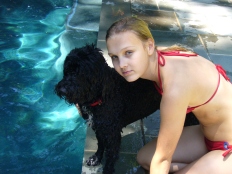You are currently browsing the tag archive for the ‘Vestibular Disease’ tag.

At the Moose Lodge of Islamorada, in the Florida Keys, our dog Teddy curled up under the table as we enjoyed Sunday brunch. Occasionally, with hopes of scoring a treat, Teddy made his presence known by venturing from under cover. With his adorable face nearly perfectly divided between black and white, he’s always hard to miss, or resist.
From his place on the floor, he sat quietly watching a woman as she poured coffee, his little head tilted to one side in a pronounced manner.
The woman stopped by our table. “Did your dog have an episode of Vestibular Disease?” she asked, leaning over to pet Teddy on the head.
I nodded, smiling, impressed at her observation of Teddy’s tell tale head tilt, an ear mark of Canine Vestibular Disease.
“I’m a local veterinarian,” she explained.
A member of the Moose organization, she was volunteering at that Sunday’s event.
I explained that it had been almost 6 months since Teddy had scared the daylights out of me when he suddenly appeared to be having a seizure. There had been no warning other than I’d noticed he’d been a little more sleepy on the days leading up to his incident. But I attributed that to seasonal allergies.
That morning in October, the sun shone brightly as I prepared to go to work as a substitute teacher. My husband Rich had left to play golf. As I gathered up my things to get out the door, I could see in my dog’s eyes a look that seemed to be pleading for me to stay.
I scooped him up and rushed him outside to his favorite tree, but once down on the ground it was evident that something was very wrong. Teddy circled, stumbled and wobbled like a late night bar patron who’d had one too many. Believing he was having a stroke or a seizure, I scooped him up again and rushed him back inside the house.

With shaking hands, I canceled my substitute assignment. and got the number for Teddy’s vet. I grabbled a pillow and once I got him secured in his seat, drove to our vet’s practice on the other side of town.
Not even 8:30 in the morning, I was relieved to see staff members at the front desk of the Brick Township (NJ) Veterinary Hospital. I whisked Teddy in and explained the situation. Within moments, a Vet Tech came out. He stooped and looked at Teddy’s eyes, then smiled reassuringly.
“His eyes are moving side to side. That’s a sign of Old Dog Vestibular Disease. He’ll be okay,” he assured.
His words brought me some relief, but the term Old Dog Vestibular Disease was perplexing.
Dr. Adam Christman, Teddy’s regular veterinarian at the time was not in yet, so one of his colleagues examined him and prescribed bonine to relieve Teddy’s dizziness. As there were no indications of an ear infection, nothing more was done.
Teddy lived a guarded life for several days. No stairs, and he slept with me on the sofa safely ensconced in a deep nest located at my feet. Stubborn as he is, he’d find a way to squirm off the sofa and crawl to his pee pad (he’s a pee pad pro) and water dish and then return to sleep on the floor below my head where I’d find him in the morning.
After a few nights of this, I called Dr. Adam to say that Teddy kept shaking his head as if he had water in his ear. Antibiotics were immediately prescribed to which Teddy responded beautifully within a three week period. In fact, he seemed to have more energy than before his incident leading me to wonder if he’d been living with a low grade ear infection for a prolonged period of time.
Thinking back to that frightful incident in October, my fears had been warranted. Symptoms of Canine Idiopathic Vestibular disease, also known as “old dog disease” or “old rolling dog syndrome”, may mimic serious, life threatening conditions such as stroke or a brain tumor.
According to Mimi Raleigh, DVM, of Hudson, NY, “Nine out of ten cases on which I was called because the owner believed their old dog had a “stroke”, were actually incidents of “idiopathic vestibular disease.” Dr. Raleigh further adds that of the geriatric dogs who survive more than a year, many have a recurrence on the other side.
The vestibular system, which has components in the brain and peripheral components in the inner and middle ear, is responsible for maintaining normal balance. The term idiopathic means that veterinarians can’t identify what is causing a dog’s sudden lack of balance. Veterinarians liken it to a case of vertigo in humans. Causes range from hypothyroidism, ear infections, head trauma, toxins or just plain old age. The condition is non-breed specific and usually dissipates within a matter of days.
Despite being fairly common, I’m still surprised by how many dog owners are unaware of Vestibular Disease in dogs. Hopefully by educating other dog lovers, I can minimize the fear should you find your older dog displaying symptoms, although it’s always best to get your dog medical attention to rule out more serious conditions.
And then there’s that tell tale head tilt that made Teddy oh-so photo ready. Many dogs never lose it, but our Teddy, perhaps due to having terrific restorative powers, and in need of no more cuteness, has managed to lose his.
He still likes to dine with us, and scout for treats, but these days, his endearing head tilt is of his own choosing and duration, not as a result of some “old dog” disease, and employed until he gets the attention, or tidbit, he feels he deserves.
That never gets old.

A FULLY RECOVERED TILTIN’ TED!











